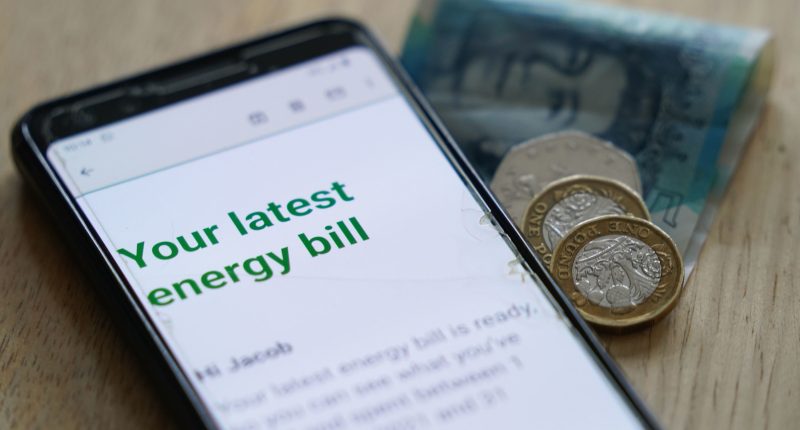ENERGY prices are on the rise, and it means households might notice their energy bills creeping up.
If you’re worried about your bills, there are a number of ways you can get a rough idea of how much you can expect to pay.
It comes as Ofgem announced it is raising its price cap from the current £1,834 for a typical dual fuel household to £1,928 from January 1
This means that the average household energy bill will rise by £94 in the new year.
The drive is almost entirely down to rising costs in the international wholesale energy market due to market instability and global events, particularly the conflict in Ukraine.
The energy price cap limits the maximum amount suppliers can charge households in England, Wales and Scotland for each gas and electricity unit.
READ MORE IN MONEY
It’s a headline price cap figure that is an average across households rather than an absolute cap on bills, so those who use more will pay more.
How much will my energy bill rise by?
To calculate how much you will pay from January 1, you must find out your unit rate for gas and electricity and the standing charge for each fuel type.
The unit rate will usually be shown on your bill in p/kWh.
The standing charge is a daily charge that is paid 365 days of the year – irrespective of whether or not you use any gas or electricity.
Most read in Money
You will then need to note down your own annual energy usage from a previous bill.
Once you have these details, you can separate your gas and electricity costs.
Multiply your usage in kWh by the unit rate cost in p/kWh for the corresponding fuel type – this will give you your usage costs.
You’ll then need to multiply each standing charge by 365 and add this figure to the totals for your usage – this will then give you your annual costs.
Divide this figure by 12, and you’ll be able to work out how much you should expect to pay each month from January.
Households who don’t pay by direct debit or a prepayment meter and instead pay on receipt of their bill will spend slightly more.
This is because this payment method has a separate unit rate and standing charge cap.
Ofgem used to set the price cap every six months. But since August last year, it has reviewed the limit every three months.
This means that annual energy bills may change again when the next price cap comes into force from April 1.
There are also calculators online that can do the working out for you.
Martin Lewis’ MoneySavingExpert (MSE) has a calculator that can show you exactly how much your energy bill could rise.
The calculator is only for customers who pay their energy bills by direct debit and will not calculate bills if you use another payment method or if you’re on a prepayment meter.
The calculator requires that you enter a key piece of information – your average energy usage in kWh or your average monthly spend.
If you choose to input your average annual energy usage, you’ll need to input how much gas and electricity you use in kWh a year.
You’ll usually be able to find this out by looking at your latest energy bill.
If you choose to input your average monthly spend, you’ll need to input your monthly gas and electricity spend.
MSE says that entering your average annual energy usage is more accurate.
You’ll then need to select your region.
Gas and electricity prices vary across UK regions because it costs providers different amounts when supplying certain areas.
You can find your region by entering your postcode at EnergyBrokers.co.uk.
You won’t need to share your personal details or address in the calculator.
Can I get help with my energy bill?
The Cold Weather Payment is made to eligible people in England, Wales and Northern Ireland.
You get £25 for each seven-day period where temperatures are zero degrees Celsius or below between November 1, 2023, and March 31, 2024.
But you can only get the payment if you are on certain benefits, including Pension Credit or Universal Credit. The full list includes:
You may also need to meet one or more of these additional criteria:
- Have a disability or be in receipt of pension premium
- Have a child who is disabled
- Be in receipt of child tax credit that includes a disability or severe disability element
- Have a severe or enhanced disability premium
- Be in receipt of a limited capability for work amount
- Have a child under five living with you
You don’t need to apply for the Cold Weather Payment, as it is made automatically.
Meanwhile, thousands of households are in line for a Winter Fuel Payment in November and December.
You qualify for the payment if you were born before September 25, 1957, and will receive between £250 and £600.
The amount you get includes a Pensioner Cost of Living payment of between £150 and £300.
In most cases, you don’t have to apply for the Winter Fuel Payment, but you will need to if you haven’t received it before.
You also need to apply if you’ve deferred your State Pension since your last Winter Fuel Payment.
Millions of households are in the process of receiving a £300 cost of living payment as well.
Payments started on October 31, and all should be made by November 19.
You can report it missing to either HMRC or the DWP starting November 20.
People on certain benefits qualify for the payment, including:
- income-based Jobseeker’s Allowance (JSA)
- income-related Employment and Support Allowance (ESA)
- Income Support
- Pension Credit
- Universal Credit
- Child Tax Credit
- Working Tax Credit
The £300 payment is the second of three, with the third expected to land in eligible household’s bank accounts before spring next year.
You can also join our new Sun Money Facebook group to share stories and tips and engage with the consumer team and other group members.
This post first appeared on thesun.co.uk










